Abstract
Aim:
Various chemical solutions have been recommended for denture disinfection; however, the immersion effect on the properties of denture base resin may also have effect on strength of the resin material. The purpose of this in vitro study was to compare and evaluate the flexural strength of heat-cure acrylic denture base resin by combination method of denture cleansing and plant extract immersion.
Materials and Methods:
In this study, ninety specimens of heat-cure acrylic denture base resin material were fabricated with dimensions of 65 mm × 10 mm × 3.3 mm. The specimens were divided into three groups, namely, Group I–III of thirty specimens each and were immersed in distilled water, denture cleanser, and thyme essential oil, respectively. The flexural strength of specimen was evaluated.
Results:
Natural plant extract showed better flexural strength than immersed in denture cleanser and control group but statistically was not significant.
Conclusion:
The study concluded that plant extract, namely, thyme essential oil, showed better flexural strength than combination method and can be used as denture cleanser.
Keywords: Fittydent®, flexural strength, thyme essential oil
INTRODUCTION
Adequate mechanical properties, sufficient esthetics, hygiene, and easy handling are basic requirements for denture base polymers. In long-term use, denture base material can get colonized and infected by microorganisms.[1] Efficient and regular hygiene is important for long-term upkeep of complete denture and is indispensible for the general health of edentulous people. Denture can be cleaned mechanically, chemically, or by combination of these methods.[2] Different types of chemical solutions have been recommended for denture disinfection. An ideal denture cleanser should be biocompatible, bactericidal, fungicidal, harmless, and nontoxic to the structure of denture; should be effectively remove deposits; and should be easy to use.[3]
The hypothesis of the study lies in that plant essential oils and extracts that have been used in food preservation, pharmaceuticals, alternative medicine, and natural therapies for many years.[4] Natural products can be an alternative to synthetic chemical substances and the interest in medicinal plants as a source of antimicrobial agents has grown dramatically. Natural products and essential oils are promising therapeutic tools for oral infection. These oils are complex mixtures of volatile compounds obtained from plant with antioxidant and antimicrobial properties against wide range of pathogens, including Candida albicans and dermatophytes.
Mechanical properties of denture resin and its strength can be affected when dentures are immersed in certain cleansing and disinfecting solution. The assessment of transverse strength of acrylic resins reported as a reliable method to estimate resin behavior under different experimental condition.[5]
The aims and objectives of the study are as follows:
To evaluate the influence of combination method of denture cleaning on flexural strength of heat-cured acrylic denture base resin
To evaluate the influence of immersion in plant extract on flexural strength of heat-cured acrylic denture base resin
To compare the influence of combination methods of dental cleansing and plant extract immersion on flexural strength of heat-cured acrylic denture base resin.
MATERIALS AND METHODS
Preparation of specimens
In this study, 90 specimens of heat-cure acrylic denture base resin were fabricated with dimensions of 65 mm × 10 mm × 3.3 mm (according to ISO/FDIS 1567), for which wax patterns were made from the addition silicon impressions obtained from metal die. The wax patterns were flasked according to conventional technique ensuring complete closure between the counter parts of the flask. Dewaxing was carried out. The molds formed were immersed in hot water to remove any traces of petroleum or wax and also facilitate the application of separating medium. The mold cavities thus obtained were used for the fabrication of the specimens. Heat-cured acrylic resin was packed and trial done before final closure. After bench curing, polymerization was accomplished by immersion in water bath for 9 h at 74°C. To avoid distortions, the flask was cooled to room temperature and then deflasked. The acrylic samples were then retrieved, and finishing and polishing were done [Figure 1].
Figure 1.
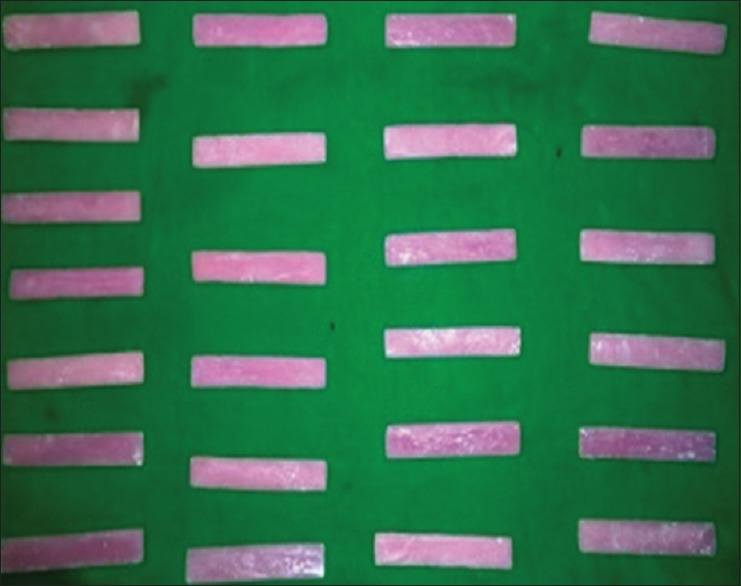
Retrieved acrylic samples
Minimal inhibitory concentration assay
The minimal inhibitory concentration (MIC) is defined as the lowest concentration of a substance that visibly inhibits the growth of an organism on dilution tubes or agar plates. Dilution method is used to determine the minimal fungicidal concentration (MFC) value of thyme essential oil. This method involves the testing of microorganisms for their ability to produce visible growth in the media and measured for turbidity units using turbidimeter (photometrically using 530 nm). The method described is intended for testing clinically significant “fungus.”
Dilution of the sample (thyme essential oil) to be tested is done by dilution method (10 ml of diluted solution is made by adding 1 ml of thyme essential oil, 1 ml of ethanol, 1 ml of 0.5% tween [it increases the solubility], and 7 ml of distilled water). This diluted solution was used in different concentrations in different test tubes of inoculated Nutrient Broth Media [Figure 2] to know the MFC value of thyme essential oil using turbidimeter. After 72 h, turbidity of test tube was checked and MFC of thyme essential oil was found to be 0.5 μl/ml. To make 1000 ml of diluted solution for immersion procedures, 5 ml of thyme essential oil, 5 ml of 0.5% tween, 80 ml ethanol, and 910 ml distilled water is added. This solution was used for immersion of Group III specimen.
Figure 2.
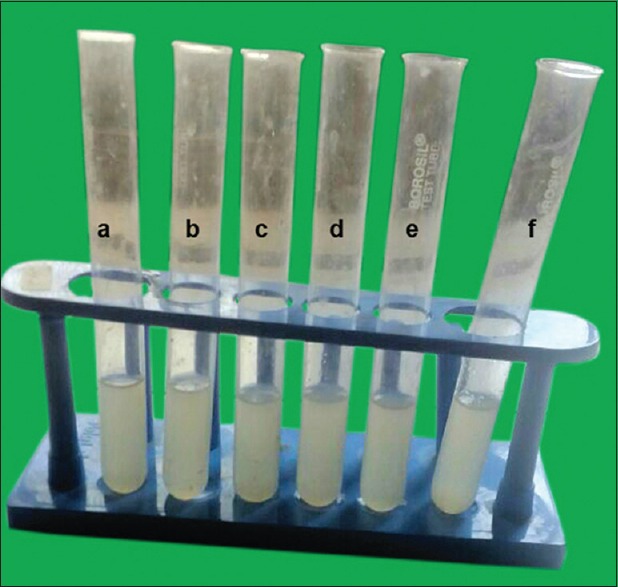
Minimal fungicidal concentration assay
Immersion of specimens
Group I (control group): Specimens were immersed in distilled water for 15 min, 3 times a day for 10 days (simulating a 15 min, daily soaking for 30 days) changing distilled water for every immersion
Group II (combination method): Specimens were brushed on all faces with a soft bristle toothbrush for 20 s [Figure 3], then were immersed in a container with 250 ml of distilled water, and one effervescent tablet of alkaline peroxide was dissolved in it for 15 min, 3 times a day for 10 days (simulating a 15 min, daily soaking for 30 days)
Group III: Specimens were immersed in thyme essential oil with MFC value of 0.5 μl/ml for 15 min, 3 times a day for 10 days.(simulating a 15 min, daily soaking for 30 days) changing solution for every immersion [Figure 4].
Figure 3.
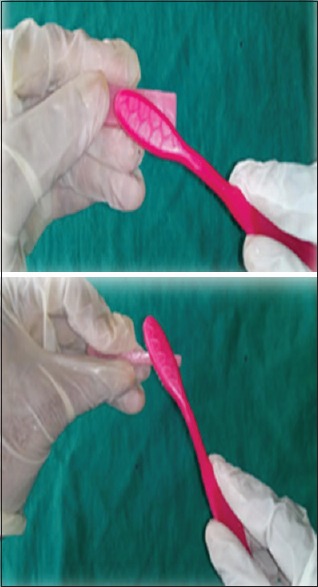
Brushing all the surfaces in combination method
Figure 4.
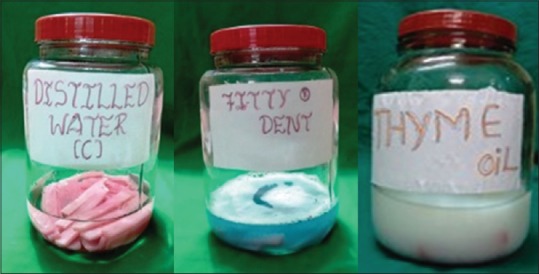
Specimens immersed
After immersion is completed, the specimens were subjected to three-point bending test
Measuring flexural strength–three-point loading
The flexural strength was measured using a three-point bending test in a Instron 3369 universal testing machine [Figure 5]. The specimens were subjected to flection until fracture. Three-point bending tests were carried out with a distance of 50 mm between the supporting points [Figure 6].
Figure 5.
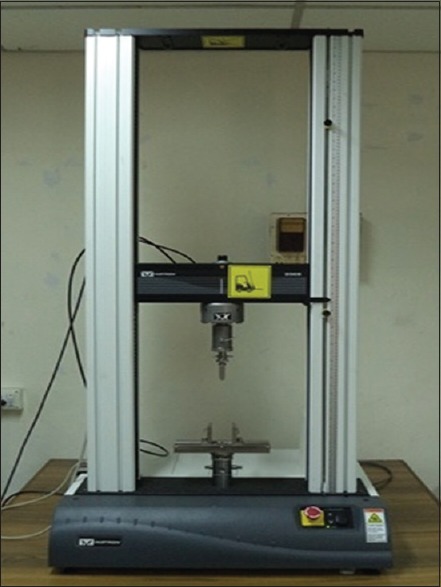
Universal testing machine
Figure 6.
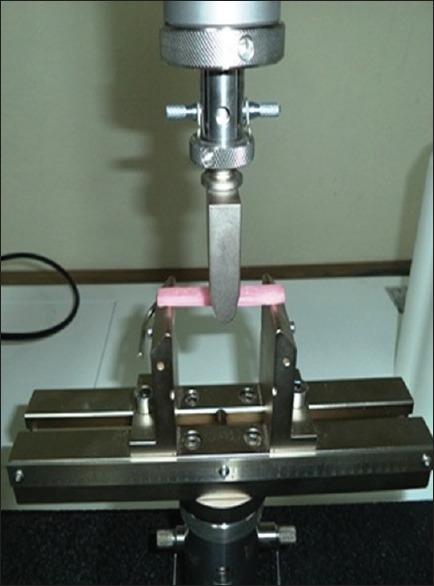
Three-point bending test
Flexural strength was calculated using the formula:
S = 3PL/2bd2
Where, S is flexural strength, P is peak load applied, L is span length (50 mm), b is the specimen width (10 mm), and d is the specimen thickness (3.3 mm). Mean flexural strength was calculated in MPa.
RESULTS
Flexural strength results were analyzed statistically by analysis of variance (ANOVA) and unpaired t-test. For all tests, P ≤ 0.05 was considered statistically significant. Mean ± standard deviation value of flexural strength of control was 86.45 ± 6.53, by combination method was 88.037 ± 14.3, and thyme essential oil was 90.27 ± 9.41 [Tables 1 and 2] (Group III > Group II > Group I).
Table 1.
Manufacturer details for all materials
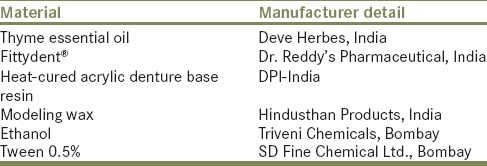
Table 2.
Mean±standard deviation of all groups (Group III > Group II > Group I)
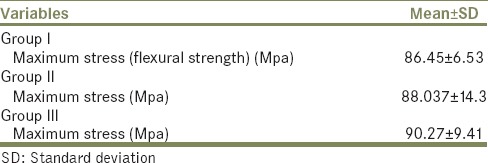
ANOVA test for flexural strength (maximum stress) (P = 0.3759) [Table 3] and unpaired t-test for between groups showed insignificant (P > 0.05) [Table 4].
Table 3.
Analysis of variance test

Table 4.
Unpaired t-test

DISCUSSION
Complete denture wearers are associated with several problems which may be transient and may be essentially disregarded by the patient or they may be serious enough that the patient feels discomfort and unable to bear the denture and some patients fail to maintain denture sanitation. Nevertheless, several studies indicate that denture cleanliness and oral hygiene of denture wearers are generally poor, thereby facilitating the formation and accumulation of an oral biofilm, resulting to risk of denture stomatitis.[6] Denture cleanliness is, thus, of paramount importance to prevent the various oral diseases and also for treatment of denture stomatitis among edentulous patients. The combination of mechanical and chemical methods is routinely recommended for denture cleansing.
Higher and aromatics plants have been used and showed inhibition against bacteria, fungi, and yeasts. Plant-derived products as disease control agents have low mammalian toxicity, less environmental effects, and wide public acceptance.[7] Liu et al. had stated that thyme essential oil is the best among plant extracts.[8] Gutiérrez et al. had proved that thymol showed complete inhibition of microorganisms such as C. albicans, Aspergillus flavus,[9] and Goncalve had concluded that thyme oil was efficient against Streptococcus mutans.[10] Studies have been done on the thyme essential oil and its properties, but few studies have been done on the effect of thyme essential oil on denture base resin. Therefore, plant extract thyme essential oil was used in this study, and influence of it on flexural strength of heat-cured acrylic denture base resin was evaluated.
The denture is in constant contact with either water or oral fluids. They come in contact with water when the patient uses water as storing medium, but the contact with denture cleanser is limited to 15–20 min used for denture cleansing. In the present study, results obtained in combination method (88.037 ± 14.3) were in agreement with Sato et al.[11] where chemical method was used for denture cleansing 15 min/day for 30 days and concluded that there was no significant change in flexural strength which was found to be 86.75 ± 7.625 MPa and also was in agreement with Raj and D’Souza[1] where there is no change in the flexural strength when denture was continuously immersed in cleanser for 4 months and also with Paranhos Hde et al.[12] who concluded that overnight immersion in a denture cleansing solution simulating a year half of use did not alter the flexural strength which was 97.61 ± 11.09 MPa, since flexural strength depends on bulk of material, and insignificant change in flexural strength indicates that the bulk of the material remained intact from the influence of cleansers. ion method is not in agreement with Peracini et al.[13] and with Shah et al.[14] as there is decrease in flexural strength of the acrylic resin when immersed in peroxide solution according to their study also flexural strength obtained in plant extract immersion has slight higher values compared to combination method (90.27 ± 9.41).
CONCLUSION
Within the limitation of this in vitro study, it can be concluded:
Thyme essential oil being a natural plant extract may have absolutely no or very minimal side effect and can be used for denture cleansing without any effect of it on flexural strength
A very low concentration of thyme essential oil (0.5 μl/ml) is sufficient for efficient denture cleansing which is viable in terms of cost and sensory characteristics
Finally, it can be concluded that thyme essential oil due to its antibacterial, antifungal, antiviral, and antioxidant property can fulfill some requirements of ideal denture cleanser.
Financial support and sponsorship
Nil.
Conflicts of interest
There are no conflicts of interest.
REFERENCES
- 1.Raj N, D’Souza M. Comparison of transverse strength of denture base resin on immersion for varying time period in water and denture cleansers. Asian J Oral Health Allied Sci. 2011;1:97–100. [Google Scholar]
- 2.Nikawa H, Hamada T, Yamashiro H, Kumagai H. A review of in vitro andin vivo methods to evaluate the efficacy of denture cleansers. Int J Prosthodont. 1999;12:153–9. [PubMed] [Google Scholar]
- 3.Abelson DC. Denture plaque and denture cleansers: Review of the literature. Gerodontics. 1985;1:202–6. [PubMed] [Google Scholar]
- 4.Imeloune B, Amhandi H, Wathelet JP, Ankit K, Khedid K, Bachiri EL. Chemical composition of the essential oil of Thyme from Eastern Morocco. Int J Agric Biol. 2009;11:205–8. [Google Scholar]
- 5.Ganesh S, Gujjari AK, Kumar SS, Ravi BM, Sowmya S, Meenakshi S, et al. Comparative study to assess the Effectiveness of Various Disinfecta- nts on two Microorganisms and the effect of same on Flexural Strength of Acrylic Denture Base Resin – An in vitro study. J Int Oral Health. 2013;5:55–62. [PMC free article] [PubMed] [Google Scholar]
- 6.Frenkel H, Harvey I, Newcombe RG. Oral health care among nursing home residents in Avon. Gerodontology. 2000;17:33–8. doi: 10.1111/j.1741-2358.2000.00033.x. [DOI] [PubMed] [Google Scholar]
- 7.Lee SO, Choi GJ, Jang KS, Lim HK, Cho KY, Kim JC. Antifungal activity of five plant essential oils as fumigant against postharvest and soil borne plant pathogenic fungi. Plant Pathol J. 2007;23:97–102. [Google Scholar]
- 8.Liu X, Zheng X, Fang W, Zhang Y. Screening of food additives and Plant Extracts against Candida albicans in vitro for preventionof denture stomatitis. Procedia Environ Sci. 2012;12:1361–6. [Google Scholar]
- 9.Gutiérrez L, Batlle R, Sánchez C, Nerín C. New approach to study the mechanism of antimicrobial protection of an active packaging. Foodborne Pathog Dis. 2010;7:1063–9. doi: 10.1089/fpd.2009.0516. [DOI] [PubMed] [Google Scholar]
- 10.Gonçalves GM, Bottaro M, Nilson AC. Effect of the Thymus vulgaris essential oil on the growth of Streptococcus mutans. J Basic Appl Pharm Sci. 2012;25:375–80. [Google Scholar]
- 11.Sato S, Cavalcante MR, Orsi IA, Paranhos Hde F, Zaniquelli O. Assessment of flexural strength and color alteration of heat-polymerized acrylic resins after simulated use of denture cleansers. Braz Dent J. 2005;16:124–8. doi: 10.1590/s0103-64402005000200007. [DOI] [PubMed] [Google Scholar]
- 12.Paranhos Hde F, Peracini A, Pisani MX, Oliveira Vde C, de Souza RF, Silva-Lovato CH, et al. Color stability, surface roughness and flexural strength of an acrylic resin submitted to simulated overnight immersion in denture cleansers. Braz Dent J. 2013;24:152–6. doi: 10.1590/0103-6440201302151. [DOI] [PubMed] [Google Scholar]
- 13.Peracini A, Davi LR, de Queiroz Ribeiro N, de Souza RF, Lovato da Silva CH, de Freitas Oliveira Paranhos H, et al. Effect of denture cleansers on physical properties of heat-polymerized acrylic resin. J Prosthodont Res. 2010;54:78–83. doi: 10.1016/j.jpor.2009.11.004. [DOI] [PubMed] [Google Scholar]
- 14.Shah VR, Shah DN, Chauhan CJ, Joshi PJ, Kumar A. Effect of denture cleansers on flexural strength and color stability of denture base materials including flexible material after using different denture cleanser. J Inf Process Syst. 2015;15:367–73. doi: 10.4103/0972-4052.164908. [DOI] [PMC free article] [PubMed] [Google Scholar]


